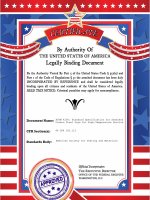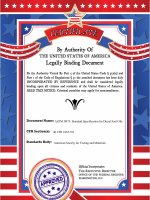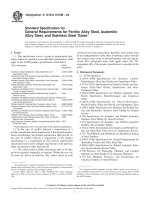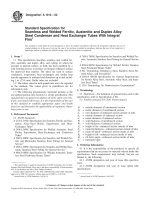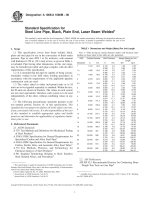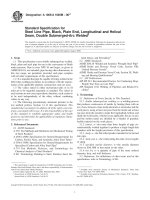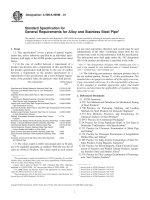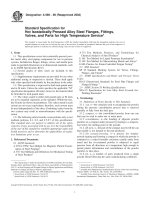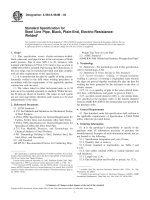ASTM D242 D242M 09 Standard Specification for Mineral Filler For Bituminous Paving Mixtures
Bạn đang xem bản rút gọn của tài liệu. Xem và tải ngay bản đầy đủ của tài liệu tại đây (68.52 KB, 2 trang )
This international standard was developed in accordance with internationally recognized principles on standardization established in the Decision on Principles for the
Development of International Standards, Guides and Recommendations issued by the World Trade Organization Technical Barriers to Trade (TBT) Committee.
Designation: D242/D242M − 19
Standard Specification for
Mineral Filler for Asphalt Mixtures1
This standard is issued under the fixed designation D242/D242M; the number immediately following the designation indicates the year
of original adoption or, in the case of revision, the year of last revision. A number in parentheses indicates the year of last reapproval.
A superscript epsilon (´) indicates an editorial change since the last revision or reapproval.
1. Scope D4318 Test Methods for Liquid Limit, Plastic Limit, and
Plasticity Index of Soils
1.1 This specification covers mineral filler added as a
separate ingredient for use in asphalt mixtures. 3. Terminology
1.2 The values stated in either SI units or inch-pound units 3.1 For definitions of terms used in this standard, see
are to be regarded separately as standard. The values stated in Terminology D8.
each system may not be exact equivalents; therefore, each
system shall be used independently of the other. Combining 4. General Description
values from the two systems may result in nonconformance
with the standard. 4.1 Mineral filler shall consist of finely divided mineral
matter such as rock dust, slag dust, hydrated lime, hydraulic
1.3 The text of this standard references notes and footnotes cement, fly ash, loess, or other suitable mineral matter. At the
which provide explanatory material. These notes and footnotes time of use, it shall be sufficiently dry to flow freely and
(excluding those in tables and figures) shall not be considered essentially free from agglomerations.
as requirements of the standard.
5. Physical Requirements
1.4 This international standard was developed in accor-
dance with internationally recognized principles on standard- 5.1 Mineral filler shall be graded within the following
ization established in the Decision on Principles for the limits:
Development of International Standards, Guides and Recom-
mendations issued by the World Trade Organization Technical Sieve Percent Passing (by Mass)
Barriers to Trade (TBT) Committee. 1.18 mm (No. 16) 100
600 µm (No. 30)
2. Referenced Documents 300 µm (No. 50) 97 to 100
95 to 100
2.1 ASTM Standards:2 75 µm (No. 200) 70 to 100
C50/C50M Practice for Sampling, Sample Preparation,
5.2 Mineral filler prepared from rock dust, slag dust, loess,
Packaging, and Marking of Lime and Limestone Products and similar materials shall be essentially free from organic
C183/C183M Practice for Sampling and the Amount of impurities and have a plasticity index not greater than 4.
Testing of Hydraulic Cement NOTE 1—Plasticity index limits are not appropriate for hydrated lime
C311/C311M Test Methods for Sampling and Testing Fly and hydraulic cement.
Ash or Natural Pozzolans for Use in Portland-Cement 6. Methods of Sampling and Testing
Concrete
D8 Terminology Relating to Materials for Roads and Pave- 6.1 Sample the mineral filler according to Practice C50/
ments C50M or C183/C183M, or Test Methods C311/C311M, which-
D546 Test Method for Sieve Analysis of Mineral Filler for ever is most appropriate for the material being sampled, except
Asphalt Paving Mixtures as noted in 6.1.1.
1 This specification is under the jurisdiction of ASTM Committee D04 on Road 6.1.1 Obtain samples at random intervals not to exceed each
and Paving Materials and is the direct responsibility of Subcommittee D04.50 on 300 tons of material as delivered.
Aggregate Specifications.
6.2 The minimum size of field samples shall be 5.0 kg
Current edition approved May 1, 2019. Published May 2019. Originally [11 lb]. Reduce the field sample to a minimum size of 2.5 kg
approved in 1926. Last previous edition approved in 2014 as D242/D242M – 09 [5 lb] for testing.
(2014). DOI: 10.1520/D0242_D0242M-19.
6.3 Determine the grading of the material by Test Method
2 For referenced ASTM standards, visit the ASTM website, www.astm.org, or D546.
contact ASTM Customer Service at For Annual Book of ASTM
Standards volume information, refer to the standard’s Document Summary page on 6.4 Determine the plasticity index by Test Methods D4318.
the ASTM website.
Copyright © ASTM International, 100 Barr Harbor Drive, PO Box C700, West Conshohocken, PA 19428-2959. United States
1
D242/D242M − 19
ASTM International takes no position respecting the validity of any patent rights asserted in connection with any item mentioned
in this standard. Users of this standard are expressly advised that determination of the validity of any such patent rights, and the risk
of infringement of such rights, are entirely their own responsibility.
This standard is subject to revision at any time by the responsible technical committee and must be reviewed every five years and
if not revised, either reapproved or withdrawn. Your comments are invited either for revision of this standard or for additional standards
and should be addressed to ASTM International Headquarters. Your comments will receive careful consideration at a meeting of the
responsible technical committee, which you may attend. If you feel that your comments have not received a fair hearing you should
make your views known to the ASTM Committee on Standards, at the address shown below.
This standard is copyrighted by ASTM International, 100 Barr Harbor Drive, PO Box C700, West Conshohocken, PA 19428-2959,
United States. Individual reprints (single or multiple copies) of this standard may be obtained by contacting ASTM at the above
address or at 610-832-9585 (phone), 610-832-9555 (fax), or (e-mail); or through the ASTM website
(www.astm.org). Permission rights to photocopy the standard may also be secured from the Copyright Clearance Center, 222
Rosewood Drive, Danvers, MA 01923, Tel: (978) 646-2600; />
2
